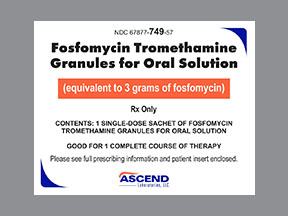
Fosfomycin Coupons & Savings Card – Discount Prices from $32.54
Generic for: Monurol
My prescription
Edit
3GM, Fosfomycin (1 Packet)
Select pharmacy

CVS
$37.03
COUPON PRICE
Walmart
$32.54
COUPON PRICE
Walgreens
$34.10
COUPON PRICE
Albertsons
$48.35
COUPON PRICEFosfomycin savings card
Show this card to your pharmacist
Walmart
$32.54
BIN
ID
PCN
GRP
015995
LHKPY524048
GDC
DR33
Powered by
More prescriptions for urinary tract infection
More prescriptions for urinary tract infection
Price history for Monurol (brand) & Fosfomycin (generic)
1 Packet, 3GM
Average retail price for Monurol
Average retail price for Fosfomycin
Average SaveHealth price for Fosfomycin
Our price history data is based on aggregated prescription data collected from participating pharmacies in America. Our prescription data updates daily to reflect the latest price changes. If you notice a missing data point, it means there wasn't sufficient data available to generate a monetary value for that date.
We analyzed Fosfomycin prices for (3GM, 1 Packet) over the last 12 months. The average retail price was $115.32, while the average price using the SaveHealth discount card was $44.01. That's a savings of approximately 61.84% when using our Fosfomycin coupon.
Compared to the generic version, Monurol had an average price of $113.97 over the same time period. With the SaveHealth savings card, Fosfomycin is 61.38% cheaper on average than Monurol.
*Retail prices are based on pharmacy claims data, and may not be accurate when we don't have enough claims.
Fosfomycin dosage forms
Dosage Quantity Price from Per unit 3GM 1 Packet $37.03 $37.03
| Dosage | Quantity | Price from | Per unit |
|---|---|---|---|
| 3GM | 1 Packet | $37.03 | $37.03 |
